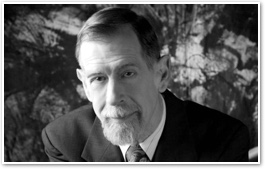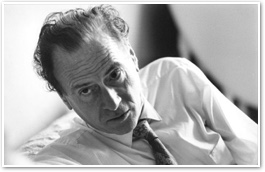In a Rearview Mirror
- DAVID WARREN
Like his father before him, Eric McLuhan had to deal with the tsunami of "information" generated in what has become a seven-billion-channel media universe.
 Eric McLuhan
Eric McLuhan1942-2018
He wasn't good at it, and no one can be. Most of these channels are wasting our time.
As a recipient of his emails, I noticed that the items he chose to flag from the Internet were hardly ever edgy. He would spot a good joke, or some revealing, unintended wordplay, that was almost shockingly harmless. He would zero in upon some obscure research, on a topic of interest to almost no one else. Only occasionally would he observe, in passing, that our world is going to Hell, and then he would find a light way to express it.
He was Marshall McLuhan's collaborator and heir, in what might be called the family business of "Understanding Media." His own son Andrew, who was with him when he died in Bogota, Colombia last week — after a very successful lecture — must pick up the torch.
Andrew, incidentally, eschews email. He prefers to send and receive handwritten letters, in envelopes with stamps.
It has been a very Catholic family. I first met Eric (seventy-six at death) as a young colleague of my father's, in what both considered a dubious Canadian educational institution. He was already a fount of exhilarating "facts and arguments," at the age of more like thirty.
On hearing that we had lost him, I searched the Internet of course, discovering old recordings of his father's lectures and interviews that I had not heard before. Closing my eyes, I could imagine it was Eric speaking, transferred from the present to the exotic lecture halls and broadcasting studios of the 1960s. Opening them I glimpsed once more a world I had partially forgotten, full of earnest young students paying riveted attention and asking polite, thoughtful questions.
He, like his father, was a beautifully backward person.
The last time I spoke with Eric, I found him still in that world. He was on fire from his readings into medieval accounts of sensory experience. The "moderns" are boxed in to five material senses, but the medievals had lost count at about twenty-seven. I wanted to know more.
A death may be not only sad, but frustrating — so much valuable learning and experience lost to the world. Who will take it up? Who will put all the remains in order as Eric had long been doing with his father's massive personal library and notes (since passed along to Toronto's Fisher Library)?
Which had filled a barn at Eric's rural home; things like four copies of Finnegans Wake, all of them crawling with marginalia.
For the McLuhans, père et fils, belonged to a species now almost extinct. They were what I call "tweedjackets." All their work on the nature of communications media began as the research of an eccentric literature professor, from Winnipeg of all frigid places. To the end, Eric was a tweedjacket, too, still teaching the "great books," when he could, to students less and less willing to read them.
He, like his father, was a beautifully backward person. They were on an essentially scientific mission, and in that sense dispassionate; "the laws of media" were being studied in the spirit of early physics. "Criticism" of these laws was therefore out of place. The question was instead, "What are they?"
 Marshall McLuhan
Marshall McLuhan1911-1980
McLuhan Senior was sometimes condemned for his chastity, in this regard. Interviewers would gravely ask what he thought of our bravely new "electric" environment. (This was before it became the "electronic.") And McLuhan Junior would, like his father, often wink the question away.
Yet if it was asked with any precision, an answer would be forthcoming. They were horrified.
"The global village is a little town where everybody is maliciously engaged in poking his nose into everybody else's business. You don't necessarily have harmony."
From such analytical remarks, one might already suspect a negative attitude towards it, yet to this day as Eric often noticed the most apocalyptic developments could still be taken as more glib evidence of "progress," and the person who predicted them still be taken as "a prophet."
Eric's misfortune, as he continued that research, was to live into a generation upon which "Menippean satire" (which is of situations, not persons) had lost its tenuous hold. The reality had outpaced the joke, now replaced by cynical irony. Only in retrospect can we see that Marshall's mid-Sixties description of how the Internet would work — once the computers had made it possible — were perfectly tame, straightforward, and accurate. The update can only be, "you ain't seen nothin' yet."
"…Anything I talk about is almost certain to be something I'm resolutely against, and it seems to me the best way to oppose it is to understand it, and then you know where to turn off the button."
Like father, like son — both, incidentally, highly traditional old-Mass Catholics, whose first resort was to their Latin missals.
"I am resolutely opposed to all innovation, all change," said Marshall more than half a century ago, in a television interview with the (still living!) Canadian cultural journalist, Robert Fulford.
"But I am determined to understand what's happening, because I don't choose to sit and let the juggernaut roll over me. Now many people seem to think that if you talk about something recent you're in favor of it. The exact opposite is true in my case. Anything I talk about is almost certain to be something I'm resolutely against, and it seems to me the best way to oppose it is to understand it, and then you know where to turn off the button."
Consider, in passing, the use of the "rearview mirror." As Eric would explain, it does not show things moving backwards. It shows things moving forward. It orients us not to where we were, but to where we are. Only men with the ability to "read" it can have an idea of what might hit them. For the rest, there is the dead-fish stasis, of unreflective movement in the traffic stream.
The medium is the message, and the message of the Internet is, paradoxically, this intellectual stasis.
 This is Meaghen Gonzalez, Editor of CERC. I hope you appreciated this piece. We curate these articles especially for believers like you.
This is Meaghen Gonzalez, Editor of CERC. I hope you appreciated this piece. We curate these articles especially for believers like you.
Please show your appreciation by making a $3 donation. CERC is entirely reader supported.

Acknowledgement
 David Warren. "In a Rearview Mirror." The Catholic Thing (May 25, 2018).
David Warren. "In a Rearview Mirror." The Catholic Thing (May 25, 2018).
This article reprinted with permission from The Catholic Thing.
The Author
David Warren is a self-confessed white male, and worse, a Roman Catholic. He pings mostly from the Parkdale district of Toronto, Canada. He has lived for a fairly long time. He was a journalist for much of this time, but also not a journalist for long stretches — in Canada, and in several other countries. He wrote a reactionary, thrice-weekly column in certain Canadian newspapers; until 2012, when his employer offered him a nice whack of money to "just go away." That money having been expended, he is open to paying gigues. For such, as for other baroque purposes, he may be reached by email through the link here. Please try to keep it civil.
Copyright © 2018 The Catholic Thing



